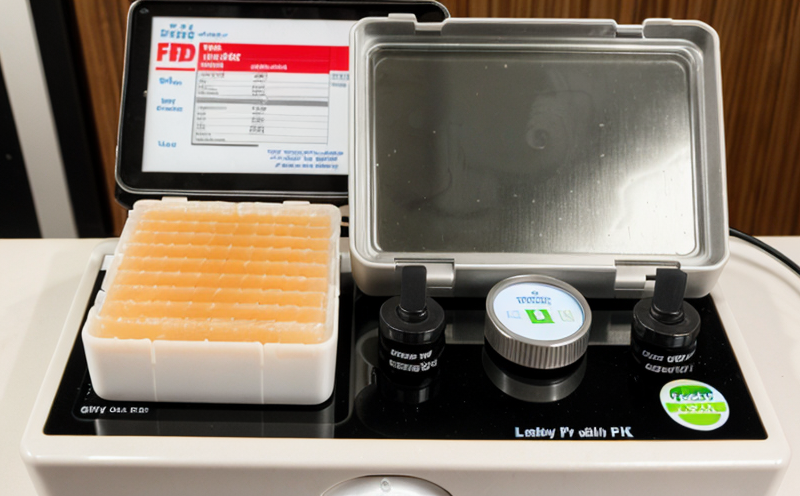ISO 31662 Lipid Oxidation Stability in Edible Oils
The ISO 31662 standard provides a method to determine the lipid oxidation stability of edible oils. This is crucial for ensuring food safety, quality, and shelf life. Lipid oxidation can lead to rancidity and other off-flavors that affect consumer acceptability and product integrity.
Edible oils are essential components in many food products, including baked goods, margarines, shortenings, and snacks. Their stability under various storage conditions is critical for maintaining product quality throughout the supply chain. This test helps manufacturers ensure that their products meet regulatory standards and customer expectations.
The method described in ISO 31662 involves subjecting samples to controlled oxidation stress using a peroxy radical generator, followed by measurement of the resulting hydroperoxide formation. The procedure is designed to simulate real-world storage conditions while providing a standardized means for comparison between different oils.
During testing, we use advanced analytical techniques such as gas chromatography and mass spectrometry to quantify lipid peroxides accurately. This allows us to assess not only the overall stability of the oil but also its susceptibility to oxidation under specific environmental factors like temperature and light exposure.
The results from this test are essential for formulating new products, optimizing existing processes, and ensuring compliance with international standards. By understanding how various conditions influence lipid oxidation rates, manufacturers can make informed decisions about ingredient selection, processing methods, packaging materials, and storage practices.
Moreover, these data contribute to broader food safety initiatives by helping identify potential risks early in the supply chain. This proactive approach ensures that consumers receive safe, high-quality products consistently across different batches and geographical regions.
In summary, ISO 31662 offers a robust framework for assessing lipid oxidation stability in edible oils, supporting both research and commercial applications. Its standardized protocols enable accurate comparisons among samples, facilitating quality control measures and regulatory compliance efforts.
Benefits
The implementation of ISO 31662 has numerous advantages for stakeholders involved in the production and distribution of edible oils:
- Enhanced Product Quality: By monitoring lipid oxidation levels, companies can ensure consistent product quality across all batches. This leads to better customer satisfaction and reduced waste due to spoilage.
- Promotes Compliance with Regulations: Adherence to international standards ensures that products meet legal requirements, protecting both businesses and consumers from harmful contaminants.
- Informs Product Development: Insights gained through this testing allow researchers to develop more stable formulations tailored to specific market needs. This includes creating extended shelf-life products without compromising safety or taste.
- Better Resource Management: Understanding how different factors impact lipid oxidation helps optimize production processes, reducing energy consumption and raw material costs.
Overall, ISO 31662 supports sustainable practices by promoting efficient resource use while enhancing food security through safer, longer-lasting products.
Why Choose This Test
Selecting the appropriate method for evaluating lipid oxidation stability is vital when dealing with edible oils. Here’s why ISO 31662 stands out:
- Standardization: With its internationally recognized status, ISO 31662 ensures consistency in testing procedures worldwide.
- Reproducibility: Results obtained using this standard are reliable and repeatable, allowing for accurate comparisons between samples or over time.
- Comprehensive Assessment: The test covers multiple aspects of lipid oxidation, providing a holistic view of the oil’s stability under different conditions.
- Advanced Techniques: Leveraging cutting-edge analytical tools ensures precise measurements and insights into even subtle changes in lipid composition.
By choosing ISO 31662, you gain access to comprehensive data that can inform strategic decisions regarding product development, quality assurance, and regulatory compliance. This knowledge base is invaluable for maintaining a competitive edge in the global market.
Quality and Reliability Assurance
At our laboratory, we employ rigorous quality assurance measures to uphold the highest standards of accuracy and precision in all our tests:
- All analysts undergo extensive training using state-of-the-art equipment calibrated according to ISO guidelines.
- We maintain strict adherence to international standards throughout every step of sample preparation and analysis.
- Our facilities are regularly audited by independent bodies ensuring continuous improvement and compliance with best practices.
- Data integrity is safeguarded through robust record-keeping systems that trace each test back to its original source material.
In addition, we offer additional services such as custom testing protocols development based on specific client requirements. Our team of experts can work closely with you to design tailored solutions suited to your unique needs ensuring optimal outcomes for your projects.





